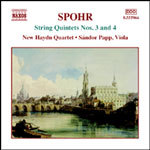
Spohr: String Quintets Nos. 3 and 4
 $25.00
Out of Stock
$25.00
Out of Stock6+ weeks add to cart
LOUIS SPOHR
Spohr: String Quintets Nos. 3 and 4
New Haydn Quartet with Sandor Papp (viola)
[ Naxos / CD ]
Release Date: Thursday 17 June 2004
This item is currently out of stock. It may take 6 or more weeks to obtain from when you place your order as this is a specialist product.
Louis Spohr was accepted during his lifetime as one of the most important composers of early German Romanticism whose career encompassed the period from Beethoven's Op. 18 string quartets to Wagner's Tristan and whose compositions covered all the major genres of that era.
Today's revival of interest in Spohr was originally fuelled by the chamber music, especially the Nonet in F major, Op. 31, Octet in E major, Op. 32 and Piano and Wind Quintet in C minor, Op. 52. It was music for strings, however, which dominated Spohr's chamber output; 36 quartets, seven quintets, a sextet and four double-quartets. Spohr was involved in chamber music all his life - some violin duos composed in 1796 when he was a twelve-year-old in Brunswick still survive and his last completed large-scale work was his 36th string quartet dating from the summer of 1857. From the time of his appointment as Kapellmeister in Kassel in 1822 (for life, but he was pensioned off in December 1857) until the year before his death Spohr organized an annual winter quartet circle at which all the classical masterpieces were performed as well as his own works and those of once popular composers such as Fesca, Onslow and Andreas Romberg. As additional string players were easily available from among his many pupils or the court orchestra he was also able to compose quintets to add some variety to the programmes and it was during this period of his life that his last five string quintets were written (1826, 1834, 1838, 1845 and 1850), whereas the first two arose much earlier, during Spohr's time as orchestral director at the Theater an der Wien in Vienna from 1813 to 1815. All of Spohr's quintets follow the model of those of his great idol, Mozart, in using a second viola.
In his memoirs Spohr tells us something about his quartet parties: "I established here [in Kassel in 1823] a quartet circle at which, in turn with some other families who were lovers of music, we gave three quartets every week, and concluded the evenings with a frugal supper. At first the quartet consisted of [Adolf] Wiele [1794-1845], solo violinist and subsequently concertmeister of our court orchestra, of my brother Ferdinand [1792-1831], who took the viola, and of our excellent cellist [Nikolaus] Hasemann [1788-1842]. But as by degrees, both in the orchestra and in this small circle, death made some vacancies, others were obliged to be substituted in their place, and then some time was always required until we obtained once more the old customary ensemble again. In 1831 my brother was first snatched from us, then Wiele, and at last Hasemann [the 74-year-old Spohr's memory is faulty here; Hasemann predeceased Wiele]; but their places were again filled by new members of our court orchestra, so that the quartet parties, which took place only in the winter months, never ceased entirely, and I myself up to quite recently [1858] played two quartets in each of them."
* * * * * * * * * * * * * * * * * * * * * * * * * * * *
The New Haydn Quartet was formed in 1994 as successor to the Haydn Quartet originally created in 1989. The quartet has since appeared in Finland, France, Austria and Germany. The present leader is János Horvath, a Moscow trained violinist, who since 1979 has been a principal of the Hungarian State Orchestra. Second violinist, Péter Sárosi, was born in 1971, and from the age of ten studied at the Liszt Academy in Budapest, where the violist of the quartet, György Porzsolt, graduated in 1980, later to serve in the Hungarian State Orchestra. The cellist Gábor Magyar completed his studies at the Liszt Academy in 1988, winning second prize in the prestigious Popper Competition in the same year. Since1990 has also been a member of the Hungarian State Orchestra.
Tracks:
String Quintet No. 3 in B minor, Op. 69
String Quintet No. 4 in A minor, Op. 91


